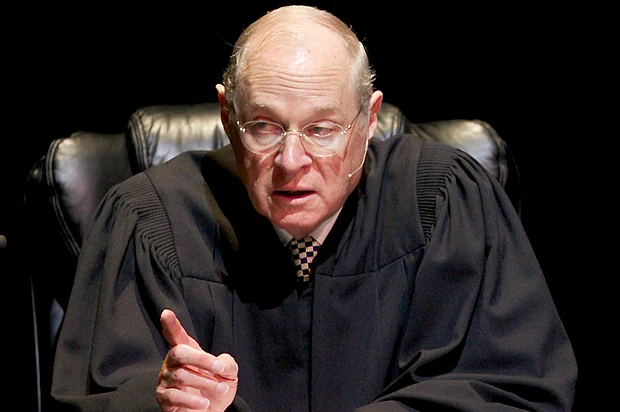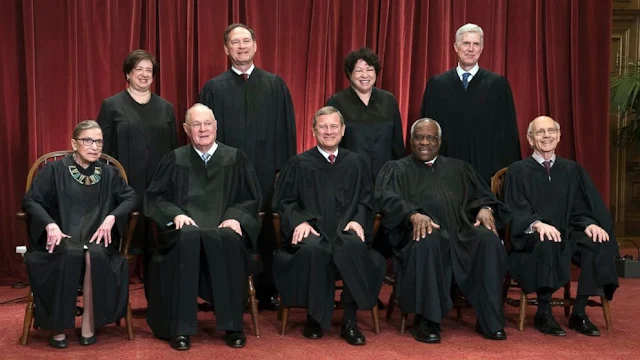 |
| Justice Anthony Kennedy was nominated by President Ronald Reagan to the Supreme Court in 1987, and was sworn in on February 18, 1988. Justice Anthony Kennedy will retire effective on July 31, 2018. |
VietPress USA (June 27, 2018): Today on Wenesday on June 27, 2018, Justice Anthony Kennedy announces he will retire effective on July 31, 2018. At the same time, President Donald Trump also told to reporters about the retirement of Justice Anthony Kennedy, during the meeting with Portuguese President Marcelo Rebelo de Sousa in the Oval Office of the White House in Washington, Wednesday, June 27, 2018.
"Anthony McLeod Kennedy (born July 23, 1936) is the senior Associate Justice of the Supreme Court of the United States. President Ronald Reagan nominated Kennedy to the Supreme Court in 1987, and Kennedy was sworn in on February 18, 1988. Since the retirement of Sandra Day O'Connor in 2006, he has been the swing vote on many of the Roberts Court's 5–4 decisions.
Born in Sacramento, California, Kennedy took over his father's legal practice in Sacramento after graduating from Harvard Law School. In 1975, President Gerald Ford appointed Kennedy to the United States Court of Appeals for the Ninth Circuit. In November 1987, after two previous attempts at nominating a successor to Associate Justice Lewis F. Powell Jr., President Reagan nominated Kennedy to the Supreme Court. Kennedy won unanimous confirmation from the United States Senate in February 1988. Kennedy became the most senior Associate Justice of the Court following the death of Antonin Scalia in February 2016.
He has authored the majority opinion in several important cases, including Boumediene v. Bush and Citizens United v. FEC. Kennedy wrote in part the majority opinions in Planned Parenthood v. Casey. He is also notable for his majority opinions in each of the Court's landmark gay rights cases: Romer v. Evans, Lawrence v. Texas, United States v. Windsor, and Obergefell v. Hodges.
On June 27, 2018, he announced his retirement from the Supreme Court, effective July 31.(Souce: Wikipedia).
President Trump is happy to nominate another Justice for replacement of the seat of Justice
Anthony Kennedy; nut it seems that Democrats will delay the vote.
Anthony Kennedy; nut it seems that Democrats will delay the vote.
Read this news on Yahoo News at: https://www.yahoo.com/news/mcconnell-rule-dems-say-vote-justice-kennedys-replacement-delayed-201440180.html
VietPress USA News
oOo
'The McConnell rule': Some Dems say the vote for Justice Kennedy's replacement should be delayed
For many Democrats, Supreme Court turnabout would be fair play.
Reaction to Justice Anthony Kennedy’s surprise announcement that he will retire from the Supreme Court on July 31 was swift for many Democrats, some of whom said the Senate should follow the standard set by Sen. Majority Leader Mitch McConnell and deny a vote to President Trump’s next nominee to the high court.
In 2016, citing the upcoming election, McConnell blocked President Obama’s Supreme Court nominee Merrick Garland. Now, with Trump and his fellow Republicans poised to cement conservative control of the high court, Democrats hope to turn the tables on the GOP.
“Our Republican colleagues in the Senate should follow the rule they set in 2016,” Senate Minority Leader Chuck Schumer said in a speech on the Senate floor. “Senator McConnell would tell anyone who listened that the Senate had the right to advise and consent — and that was every bit as important as the president’s right to nominate.”
Schumer also said the Senate should reject any Supreme Court pick who would vote to overturn Roe v. Wade, the landmark 1973 decision that affirmed a woman’s right to have an abortion.

“McConnell set the new standard by giving the American people their say in the upcoming election before court vacancies are filled,” Sen. Dick Durbin, D-Ill., told reporters. “We’re four months away from an election where the American people will decide the majority in the United States Senate. Following the tortured logic of Mitch McConnell, let’s let the American people speak.”
“This Supreme Court vacancy puts issues that affect every single American in the balance, from a woman’s constitutionally protected right to make her own health care decisions to privacy, equality and civil rights,” Sen. Kamala D. Harris, D-Calif., said in a statement. “Given the stakes of this seat, which will determine the fate of protected constitutional rights, the American people, who are set to vote in less than four months, deserve to have their voice heard. We should not vote on confirmation until they have voted at the ballot box.”
Harris’ counterpart, Sen. Dianne Feinstein, D-Calif., echoed the call.
“[Four] months away from an election, there should be no consideration of a Supreme Court nominee until the American people have a say,” Feinstein tweeted. “Leader McConnell set that standard when he denied Judge Garland a hearing for nearly a year, and the Senate should follow the McConnell Standard now.”
“Under the McConnell Rule, there is no rush to fill this seat,” Sen. Patrick Leahy, D-Vt., said. “The American people deserve a chance to have their voices heard.”
Sen. Tammy Duckworth, D-Ill., used McConnell’s own defense for blocking Garland in her reaction to Kennedy’s retirement.
“Senator McConnell set a precedent when he refused to hold a hearing on Merrick Garland, and he should stick to the rule he set,” Sen. Chris Murphy, D-Conn., said in a statement. “Under the McConnell rule, the Senate shouldn’t consider any nominee for the Supreme Court until January, and I expect Republicans in the Senate to honor the rule they all agreed to just two short years ago.”
Murphy added: “If McConnell insists on starting proceedings on a radical Trump nominee, I will do everything in my power to stop him. I did not run for the Senate to grease the skids for radicals on the Supreme Court to decimate the rights of millions of Americans. The existing court’s assault on voting rights, collective bargaining and religious liberty is awful enough — just imagine how bad working people will have it if another right-wing justice joins the court. This is a red alert moment for the American people — we need all hands on deck to stop the court from taking a vicious, anti-worker, anti-women, anti-LGBT, anti-civil rights turn.”
www.Vietpressusa.us





